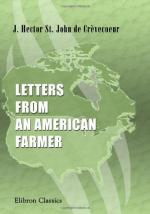The Sunday meetings, exclusive of religious benefits,
were the only social bonds that might have inspired
them with some degree of emulation in neatness.
Is it then surprising to see men thus situated, immersed
in great and heavy labours, degenerate a little?
It is rather a wonder the effect is not more diffusive.
The Moravians and the Quakers are the only instances
in exception to what I have advanced. The first
never settle singly, it is a colony of the society
which emigrates; they carry with them their forms,
worship, rules, and decency: the others never
begin so hard, they are always able to buy improvements,
in which there is a great advantage, for by that time
the country is recovered from its first barbarity.
Thus our bad people are those who are half cultivators
and half hunters; and the worst of them are those
who have degenerated altogether into the hunting state.
As old ploughmen and new men of the woods, as Europeans
and new made Indians, they contract the vices of both;
they adopt the moroseness and ferocity of a native,
without his mildness, or even his industry at home.
If manners are not refined, at least they are rendered
simple and inoffensive by tilling the earth; all our
wants are supplied by it, our time is divided between
labour and rest, and leaves none for the commission
of great misdeeds. As hunters it is divided between
the toil of the chase, the idleness of repose, or
the indulgence of inebriation. Hunting is but
a licentious idle life, and if it does not always pervert
good dispositions; yet, when it is united with bad
luck, it leads to want: want stimulates that
propensity to rapacity and injustice, too natural
to needy men, which is the fatal gradation. After
this explanation of the effects which follow by living
in the woods, shall we yet vainly flatter ourselves
with the hope of converting the Indians? We should
rather begin with converting our back-settlers; and
now if I dare mention the name of religion, its sweet
accents would be lost in the immensity of these woods.
Men thus placed are not fit either to receive or remember
its mild instructions; they want temples and ministers,
but as soon as men cease to remain at home, and begin
to lead an erratic life, let them be either tawny
or white, they cease to be its disciples.
Thus have I faintly and imperfectly endeavoured to
trace our society from the sea to our woods! yet you
must not imagine that every person who moves back,
acts upon the same principles, or falls into the same
degeneracy. Many families carry with them all
their decency of conduct, purity of morals, and respect
of religion; but these are scarce, the power of example
is sometimes irresistible. Even among these back-settlers,
their depravity is greater or less, according to what
nation or province they belong. Were I to adduce
proofs of this, I might be accused of partiality.
If there happens to be some rich intervals, some fertile
bottoms, in those remote districts, the people will
there prefer tilling the land to hunting, and will
attach themselves to it; but even on these fertile
spots you may plainly perceive the inhabitants to
acquire a great degree of rusticity and selfishness.




